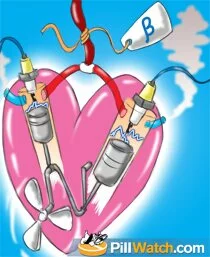
Stepping on the accelerator is not the only skill which helps a racer win the competition. A good driver should also understand clearly the moments, when it is vitally important to ease up the foot-throttle and to decrease the engine speed.
It seems amazing but the human organism also has its own accelerating system, which makes the heart work faster and with more power. The widely known hormone adrenaline plays the role of a food-throttle in the human body. Once it is released in the bloodstream – the speed of heartbeat and the force with which the heart muscle contracts increase.
However, accelerating the speed and power also brings certain dangers – the engine becomes worn out more quickly, and the chances of breakage increases. To prevent this every driver knows how to decrease the engine speed and power – simply ease the foot off the accelerator pedal.
Human body does not have pedals to control its work, and we cannot regulate the release of adrenaline manually. The causes for adrenaline release may be different – once Alfred Hitchcock said "I am scared easily, here is a list of my adrenaline production: small children, policemen, high places, and that my next movie will not be as good as the last one". Emotional stress either positive or negative is the most often cause of adrenaline release. When the adrenaline is released too often, making heart and arteries work on the maximum, this may result in different diseases, such as hypertension, angina, heart failure, etc.
That is why, to suppress the adrenaline action and prevent the development of cardiovascular problems people use medicines called beta-blockers. In general, this class of medications works by suppressing the stimulative effect of adrenaline in the human body. Beta-blockers can also reduce blood pressure and improve blood flow due to relaxing and opening up the blood vessels.
Angina is one of the conditions, treated with the help of beta-blockers. Atenolol, metoprolol, nadolol, propranol and propranolol are the FDA approved medications to be used for treatment of chronic angina.
Angina also known as chest pain is a medical condition, which manifests itself as the squeezing, pressure, heaviness or aching behind the breastbone. Angina pain often spreads to the neck, jaw, arms. Though it does not usually last long (1-15 minutes), it is a serious condition, demanding adequate medical help.
Angina is explained by the lack of oxygen, which is necessary for the heart muscle. By other words, angina pain appears when the heart requires more oxygen (for example, to work harder under the influence of adrenaline), but the blood vessels cannot supply enough oxygen to heart muscle due to the narrowed arteries, etc.
In this case beta-blockers help to relieve angina pain by inhibiting the effect of adrenaline on the heart. As the result, heart rate decreases, as well as the blood pressure and the pumping force of the heart muscle; and, finally, this leads to the reduction of the heart’s demand for oxygen and relief of angina pain.
The exact cause of migraine still remains undiscovered. However, in late 60th of the previous century people noticed that the use of beta-blockers helped to reduce the frequency and severity of migraine attacks.
Among all beta-blockers, propranolol, timolol, metoprolol, nadolol and atenolol are the most commonly prescribed for the treatment of migraines.
It is considered that beta-blockers help to relieve migraine pain by stabilizing blood vessels in the brains, not letting them to narrow or dilate too much. Besides, beta-blockers can effectively reduce the excitability of the nervous system by inhibiting the effect of adrenaline. Thus these medications reduce stresses, which are known to trigger migraine attacks.

In general, beta-blockers are considered to be safe medications. However, since they slow down the heart activity and reduce blood pressure, people may feel tired, dizzy or faint after taking beta-blockers. Some men can even experience problems with erection.
The feeling of cold in hands and feet may also develop due to the reduced heart beat and blood circulation under the influence of beta-blockers. Less common side effects include abdominal pain, digestive disorders, skin rash, depression and sore throat.
Finally, one should always remember that the use of beta-blockers should never be stopped abruptly. Just like pushing the foot-throttle in the car or easing it off abruptly can worsen the controllability of the vehicle, the abrupt quitting of the beta-blockers therapy can increase the risks of heart attack in people.
| Tip for you : Sign-in with Your OpenID and post faster, easier and with easy access to all your past posts. | |
|
Your Nick: |














